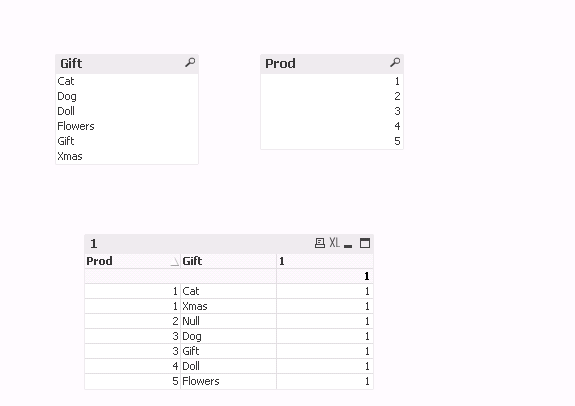Unlock a world of possibilities! Login now and discover the exclusive benefits awaiting you.
- Qlik Community
- :
- All Forums
- :
- QlikView App Dev
- :
- Concat string
- Subscribe to RSS Feed
- Mark Topic as New
- Mark Topic as Read
- Float this Topic for Current User
- Bookmark
- Subscribe
- Mute
- Printer Friendly Page
- Mark as New
- Bookmark
- Subscribe
- Mute
- Subscribe to RSS Feed
- Permalink
- Report Inappropriate Content
Concat string
Dear all,
I have a one table like
| Product |
| 1 |
| 2 |
| 3 |
| 4 |
| 5 |
| 6 |
| 7 |
| 8 |
| 9 |
| 10 |
and other table like
| Product | Event |
| 2 | Gift |
| 2 | Xmas |
| 3 | Gift |
| 5 | Gift |
| 7 | Gift |
| 7 | Xmas |
| 10 | Gift |
| 10 | Xmas |
| 10 | New Year |
Now I want in Staight table like below..
| Product | Event |
| 1 | None |
| 2 | Gift, Xmas |
| 3 | Gift |
| 4 | None |
| 5 | Gift |
| 6 | None |
| 7 | Gift, Xmas |
| 8 | None |
| 9 | None |
| 10 | Gift, Xmas, New Year |
Acually I want to concate all event against the Product in Straight Table.
Please help me.
Regards
Vinay
- Tags:
- new_to_qlikview
Accepted Solutions
- Mark as New
- Bookmark
- Subscribe
- Mute
- Subscribe to RSS Feed
- Permalink
- Report Inappropriate Content
I would try putting the if() within the aggregation function so that it calculates at the detailed level and then puts together a delimitted list of the distinct values.
Concat(Distinct if(IsNull(Event),'None',Event) ,',')
- Mark as New
- Bookmark
- Subscribe
- Mute
- Subscribe to RSS Feed
- Permalink
- Report Inappropriate Content
Hi Vinay,
Concat(Distinct Event,',')
give that a try in your expression with Product as your dimension
hope that helps
Joe
- Mark as New
- Bookmark
- Subscribe
- Mute
- Subscribe to RSS Feed
- Permalink
- Report Inappropriate Content
Load first table and left join the second table.
Then do a resident load with a group by
LOAD
Product,
if(isNull(Event),'None',Concat(Event,','))
Resident Table
Group by Product;
Edit:
Thought you wanted to achieve that in the script - for a straight table solution go with the above suggestion.
- Mark as New
- Bookmark
- Subscribe
- Mute
- Subscribe to RSS Feed
- Permalink
- Report Inappropriate Content
Hi,
i am using below in straight table expression
if(IsNull(Event),'None',Concat(Distinct Event,','))
but not give me coorect result.
- Mark as New
- Bookmark
- Subscribe
- Mute
- Subscribe to RSS Feed
- Permalink
- Report Inappropriate Content
Hi,
Just load the two tables with Field name 'Product' remaining same.
Attaching the document for your help.

- Mark as New
- Bookmark
- Subscribe
- Mute
- Subscribe to RSS Feed
- Permalink
- Report Inappropriate Content
An example app would be good if possible
- Mark as New
- Bookmark
- Subscribe
- Mute
- Subscribe to RSS Feed
- Permalink
- Report Inappropriate Content
Hi, please check attachment, I provided a script solution and a expression solution.
Hope this helps.
- Mark as New
- Bookmark
- Subscribe
- Mute
- Subscribe to RSS Feed
- Permalink
- Report Inappropriate Content
I would try putting the if() within the aggregation function so that it calculates at the detailed level and then puts together a delimitted list of the distinct values.
Concat(Distinct if(IsNull(Event),'None',Event) ,',')